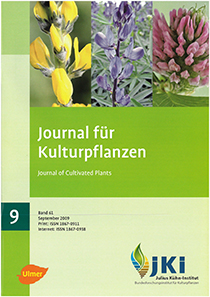Cultivation of Grain Legumes in Germany – Situation, Limiting Factors and Chances
DOI:
https://doi.org/10.5073/JfK.2009.09.01Keywords:
Faba bean, pea, sweet lupin, sustainable agriculture, biodiversity, feed, value-added chainAbstract
The grain legumes faba bean, pea and sweet lupin steadily lose importance in cultivation and breeding. The acreage of grain legumes has been decreasing since many years and breeding programmes are discontinued. Protein-crops coupled aid and agri-environmental measures both are not sufficient to stop this development or to turn it back. As a consequence, the situation of grain legumes is determined by various limiting factors and is further aggravated by a lack of mass flow in the system. This is despite the fact that the growing of faba beans, peas and sweet lupins may bring about a number of benefits, such as self-sufficiency with regard to nitrogen supply and, as a consequence, savings in fossil energy, or the option to widen crop rotations and increase biodiversity in agriculture. Grain legumes serve valuable feed and can be used with high rates in livestock feeding. When devising strategies to stop the decline in the use of home-grown grain legumes, it will be mandatory to consider the whole value-added chain comprising breeding, cultivation, trade as well as processing and to bring together the relevant stakeholders from associations, science and politics. The fact is essential that first and very fast the further decrease in cultivation should be stopped and a sustainable expansion of faba beans, peas and sweet lupins cultivated area must be achieved.
Downloads
Published
Issue
Section
License
The content of the journal is licensed under the Creative Commons Attribution 4.0 License. Any user is free to share and adapt (remix, transform, build upon) the content as long as the original publication is attributed (authors, title, year, journal, issue, pages).
The copyright of the published work remains with the authors. The authors grant the Journal of Cultivated Plants, the Julius Kühn-Institut and the OpenAgrar repository the non-exclusive right to distribute and exploit the work.







